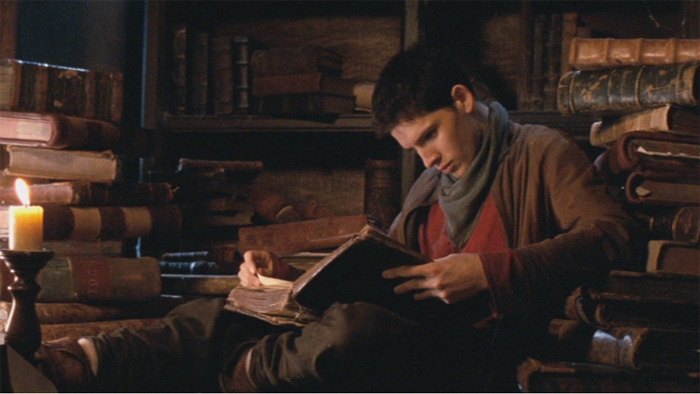When the first kernel of the novel I am working on now ( More Worthy of Heaven) sprouted in my head, I had no idea it would spring into full bloom in….FIRST
PERSON NARRATIVE.
As a historical author, I find first person very
challenging. First person present completely unachievable.
But, after I had scribbled a prologue one afternoon in an
old notebook as the threads of thoughts started to sew into something of colour
and shape, Elyse’s voice just began
talking to me.
...She talked directly to me. Her narrative expelled itself into
my head. Then, suddenly, I had Gabriel
---my forgeron, my blacksmith,
talking to me and he wanted to tell his side of the story in his own words.
 |
| any chance to use a snapshot of Merlin being bookish.... |
Now I had two narrative voices bouncing back and forth. Sometimes
offering commentary on overlapping action, sometimes adding their own
vulnerability, spicing up their own presentation of an event come to pass….
On the weekend, Nathaniel Tavington, the British redcoat who
becomes the object of Elyse’s forbidden affections, wrote a few letters home to England on scrips
and scraps of paper with the dripping nub of his goose-feather pen.
All of the above are tricky. They are difficult. I am
forever having to go back at the end of a chapter and check for tenses and make
sure that the action is very much ( as it should be even when in the
supposition of first person narrative) in deep p.o.v. But, Nathaniel gives me a bit of an
out. The first part of the story tells of the
chafing culture of L'Acadiens: settled farmers who work in equality and
prosperity, peaceful and with great ties to their old land of France and their
culture and the threat of the English redcoats to force them to surrender to
the crown. British Garrisons and forts,
their cloistered quarters and their slovenly manners and sweat-stained reek of
drink, idleness and, well, sheer boredom between battle, fascinate me and have
oft been a subject of my reading.
By having Nathaniel, the only English voice in my novel,
offer glimpse into his world and his life serves me well because although his race is
very much the enemy in this story, I want to ensure that he doesn’t become a
caricature, that Elyse’s fascination with him is well-founded, that the reader
is able to glean some semblance of sympathy even though their affections may
not always be hoisted in his direction.
What brings me to ramble about this is a bit of an ode to
the creative juices that slosh around in my brain now and then. This is the reason I love writing. It is a
jolt. An addiction and it is an unexpected pounce of adrenaline at opportune
(sitting at a coffee shop with a blank sheet and plenty of time ) and
inopportune (waking up at 3:30 a.m. on a work night and diving for my pen and a
postit to scribble things I may not be able to make coherent sense of come
morning ) moments. My favourite,
favourite part of writing is when the characters reveal themselves to me: their
purposes, their motivations ,their likes and dislikes, their passions and their
vulnerabiltiies.
In the aforementioned case, they even told me how they
wanted their voices to be heard; and, most importantly, that they wanted a
chance at perspective. They have a story
to tell and I as their intrepid portal, their obliging vessel, have the
opportunity to give it a good shot.
I must confess to
having completely fallen in love (head over heels ) for Gabriel in my little
story. He pops up in my brain and talks
in his gruff French accent while swigging a hard-earned drought of ale at the end
of a hot day, caressing the fur of Bottes,
his petite three-legged cat and I
think he likes me too. He has an eyebrow
that raises now and then and his smile is hard-earned, his laugh even more so;
but when they finally sluice through my conscious, it is more than delicious.
I can smell his little cabin and see the sheen of sweat and
soot on his brow, as bespeaks his profession.
He gets to act quite heroic in the second part of the story ---which I
have not quite written yet--- and I know he does not know, as I omniscient
tale-teller do, all of the adventures that await. I sense he is a little
apprehensive, a little tortured and worried over his current state; but he need
not be. I have a great path for
him---not always smooth, and jutting through a few forks and crevices; but I
promise him some happiness out of it all. That’s what we romantic sorts do.
If you want to see more of Gabriel and Elyse’s world, including how I "cast" them in my head, check
out my evolving Pinterest board
1 comment:
Lovely. I want to read this story now. You had me at British Garrisons and forts, a subject I am researching. Got a Royal Yorker on the St. Leger expedition, 1777, in the series in progress.
What a vivid picture of Gabriel you just painted.
Post a Comment